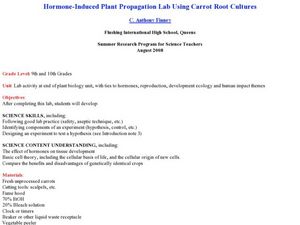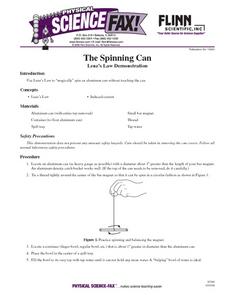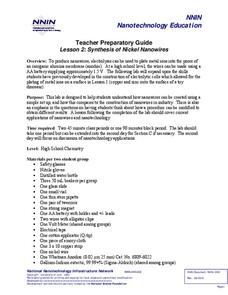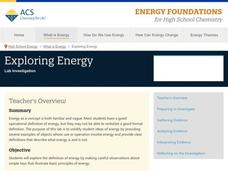Curated OER
Hormone-Induced Plant Propagation Lab using Carrot Root Cultures
Young scholars evaluate the importance of hormones in living things. In this biology lesson plan, students experiment on carrots to differentiate how humans and plants reproduce. They collect data from experiment to answer analysis...
Curated OER
Science: Lenz's Law and the Spinning Can
Students observe a demonstration of Lenz's Law using an aluminum can and a bar magnet. They hypothesize what will occur as the can is placed in water and the magnet is lowered above it on a string. Students discover the phase shift...
Curated OER
Providing Safe Food to the Consumer
Students identify safe practices that must be followed to assure the food chain from the farm or ranch to dinner table is providing safe and quality food for the consumer. Students visit websites to examine numbers of food borne...
Curated OER
Bungee Man Lab
Students explore the motion of a toy bungee jumper using the scientific method. They view a video of a bungee jumper and discuss what can be measured about a bungee jump. Students discuss the scientific mehtod and how to design an...
Curated OER
Ocean Absorption Lab
Young scholars examine various techniques that can reduce carbon dioxide in the atmosphere, and use chemistry to simulate oceanic sequestration. They conduct an experiment involving the method of oceanic absorption for carbon...
Curated OER
Geo Sequestration Lab
Students explore geologic sequestration as a technique used to reduce carbon dioxide in the atmosphere. They use chemistry to stimulate oil mining. Students conduct an experiment to learn about geo carbon sequestration.
Curated OER
National Chemistry Week
National Chemistry Week lessons enliven classroom science investigations.
Curated OER
Testing Your Water
Students perform several water quality tests on groundwater from their area. They use test strips to determine the pH, hardness, alkalinity, nitrates, iron and chloride levels.
Cornell University
Nano What?
The size of a nanoparticle is difficult for pupils to grasp. A hands-on experiment is designed to give your classes perspective. Learners analyze different sports drinks for the content of electrolytes as an introduction to nanoscale....
Curated OER
Plate Tectonics: Second Grade Lesson Plans and Activities
Second graders explore convection currents and how they relate to the movement of tectonic plates. Then, young geologists reconstruct Pangaea with a worksheet and pinpoint plate boundaries on a map using locations of earthquakes and...
Beyond Benign
Product Test
It's the moment of truth. Previous lessons in the 24-part series had scholars design and develop shampoo formulas using chemical concepts. The 18th lesson asks them to test the function of their shampoos. To do this, they calculate the...
National Nanotechnology Infrastructure Network
Synthesis of Nickel Nanowires
It's all about the scale—they're not just wires, they're nanowires! The second lesson of the series builds on the oxidation-reduction experiment in the first lesson. Scholars synthesize a sample of nanowires using electrolysis. As they...
Curated OER
Cents-ible Chemistry-Analysis of the Metal in a Penny
Students determine the base metals and surface metals in a penny. In this analysis of metals lesson plan, students determine the density of five pennies minted in different years. They use different chemicals such as hydrochloric acid,...
Beyond Benign
Catalysts and Oxygen
Here is an engaging and hands-on lesson plan that allows high school chemists to demonstrate the effects of a catalyst on various chemicals. They garner knowledge of how reactants and products differ from one another, while analyzing the...
American Chemical Society
Exploring Energy
When asked to list everyday objects that require energy, most people list technology that use batteries or electricity. Through hands-on exploration, young scientists discover energy is much more than just circuitry. They play with...
National Nanotechnology Infrastructure Network
Understanding Wave Motion - Slinky vs. Snaky: Which Spring is Dominant?
Ride the wave to an understanding of refraction! The first in a series of two inquiry-based lessons challenges learners to create transverse waves with two different types of springs. As their wave hits an object, they observe the change...
National Nanotechnology Infrastructure Network
The Effects of Gold and Silver Nanoparticles on Brine Shrimp: A Toxicology Study
Who doesn't love gold and silver? Brine shrimp, that's who! Learners conduct an experimental lesson to monitor the toxicity of gold and silver nanoparticles on brine shrimp. They synthesize solutions to expose the brine shrimp to and...
Curated OER
# 03 Laboratory Ventilation and Risk Assessment Exercise
Students are introduced to the analysis of health risks in the laboratory, particularly from vapors from organic solvents. They consider quantitative measure of risk such as threshold limit values (TLVs), the amount of the compound that...
American Chemical Society
Entropy and Enthalpy Changes
My room isn't messy — it's a scientific experiment in entropy! Scholars investigate entropy, enthalpy, and spontaneity through a guided procedure and set of questions. The lesson connects the Second Law of Thermodynamics, energy transfer...
American Chemical Society
Energy and Entropy of a Stretched Rubber Band
Stephen Perry invented and patented the modern rubber band in 1845. Young scientists put his discovery to work as they use rubber bands to observe entropy and enthalpy. They determine the change in free energy to figure out if it...
National Nanotechnology Infrastructure Network
Creating and Testing Silver-Nanoparticle Socks
Antibacterial socks are a product of nanotechnology. An inquiry-based lesson asks collaborative groups to create their own antibacterial socks and then test them against other products on the market. The sock with the least amount of...
Curated OER
Digital Video Lesson Plan: Brine Shrimp
Students participate in classroom experiment to gain better understanding of type of environment brine shrimp can best survive. Students then explore effects of common saltwater pollutants on survival of animals in sea.
Curated OER
Mighty Minerals
Students identify the characteristics of minerals. They complete proper identification tests and record the data in an organized fashion. They list important uses for minerals as well.
American Chemical Society
Exothermic, Endothermic, and Chemical Change
Scientists can't observe bonds breaking or forming, so how do they distinguish between exothermic and endothermic reactions? Young scholars complete two experiments to do just that. They monitor temperature change and calculate the...
Other popular searches
- Science Lab Safety Rules
- Physical Science Lab Safety
- Teaching Science Lab Safety
- Science Lab Safety Symbols
- Science Lab Safety Chart
- Science Lab Safety Contract
- Science Lab Safety Equipment
- Science Lab Safety Videos
- Science Lab Safety Activities
- Science Lab Safety Activites
- Safety in the Science Lab
- Science Lab Safety Song

























